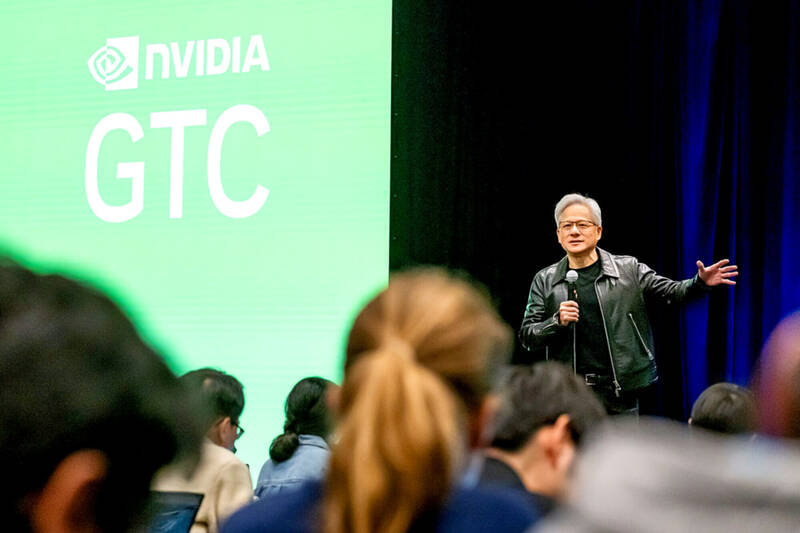US chipmaker Nvidia Corp is planning to build a research and development center in Shanghai, the Financial Times reported yesterday, as tighter export restrictions imposed by Washington threaten sales in the key Chinese market.
The tougher US controls in recent years have prevented the California-based firm from selling certain AI chips — widely regarded as the most advanced in the world — to China.
As a result, it is now facing tougher competition from local players in the crucial market, including Huawei Technologies Co (華為).

Photo: Bloomberg
Nvidia boss Jensen Huang (黃仁勳) discussed plans to set up a research and development center in Shanghai with its mayor during a visit to the city last month, the newspaper reported, citing two unnamed people familiar with the matter.
The site would “research the specific demands of Chinese customers and the complex technical requirements needed to satisfy Washington’s curbs,” the report said, adding that the “actual core design and production” would remain outside of China in order to comply with intellectual property transferal regulations.
Nvidia did not immediately respond to a request for comment, nor did Shanghai authorities.
During a visit to Beijing last month, Huang met with Chinese Vice Premier He Lifeng (何立峰), telling him that he “looked favorably upon the potential of the Chinese economy,” Chinese state media Xinhua said.
Huang said he was “willing to continue to plough deeply into the Chinese market and play a positive role in promoting US-China trade cooperation,” Xinhua said.
The tightened US export curbs come as China’s economy wavers, with domestic consumers reluctant to spend and a prolonged property sector crisis weighing on growth.
Chinese President Xi Jinping (習近平) has called for the country to become more self-reliant as uncertainty in the external environment increases.
Xi last month said that China should “strengthen basic research, focusing our efforts on overcoming challenges in key technologies such as advanced chips and core software, and building an autonomous artificial intelligence [AI] system,” Xinhua said.
Washington has expanded its efforts over the past few years to curb exports of state-of-the-art chips to China, concerned that these can be used to advance Beijing’s military systems and otherwise undermine US dominance in AI.

SEMICONDUCTORS: The German laser and plasma generator company will expand its local services as its specialized offerings support Taiwan’s semiconductor industries Trumpf SE + Co KG, a global leader in supplying laser technology and plasma generators used in chip production, is expanding its investments in Taiwan in an effort to deeply integrate into the global semiconductor supply chain in the pursuit of growth. The company, headquartered in Ditzingen, Germany, has invested significantly in a newly inaugurated regional technical center for plasma generators in Taoyuan, its latest expansion in Taiwan after being engaged in various industries for more than 25 years. The center, the first of its kind Trumpf built outside Germany, aims to serve customers from Taiwan, Japan, Southeast Asia and South Korea,

Gasoline and diesel prices at domestic fuel stations are to fall NT$0.2 per liter this week, down for a second consecutive week, CPC Corp, Taiwan (台灣中油) and Formosa Petrochemical Corp (台塑石化) announced yesterday. Effective today, gasoline prices at CPC and Formosa stations are to drop to NT$26.4, NT$27.9 and NT$29.9 per liter for 92, 95 and 98-octane unleaded gasoline respectively, the companies said in separate statements. The price of premium diesel is to fall to NT$24.8 per liter at CPC stations and NT$24.6 at Formosa pumps, they said. The price adjustments came even as international crude oil prices rose last week, as traders

Taiwan Semiconductor Manufacturing Co (TSMC, 台積電), which supplies advanced chips to Nvidia Corp and Apple Inc, yesterday reported NT$1.046 trillion (US$33.1 billion) in revenue for last quarter, driven by constantly strong demand for artificial intelligence (AI) chips, falling in the upper end of its forecast. Based on TSMC’s financial guidance, revenue would expand about 22 percent sequentially to the range from US$32.2 billion to US$33.4 billion during the final quarter of 2024, it told investors in October last year. Last year in total, revenue jumped 31.61 percent to NT$3.81 trillion, compared with NT$2.89 trillion generated in the year before, according to

PRECEDENTED TIMES: In news that surely does not shock, AI and tech exports drove a banner for exports last year as Taiwan’s economic growth experienced a flood tide Taiwan’s exports delivered a blockbuster finish to last year with last month’s shipments rising at the second-highest pace on record as demand for artificial intelligence (AI) hardware and advanced computing remained strong, the Ministry of Finance said yesterday. Exports surged 43.4 percent from a year earlier to US$62.48 billion last month, extending growth to 26 consecutive months. Imports climbed 14.9 percent to US$43.04 billion, the second-highest monthly level historically, resulting in a trade surplus of US$19.43 billion — more than double that of the year before. Department of Statistics Director-General Beatrice Tsai (蔡美娜) described the performance as “surprisingly outstanding,” forecasting export growth